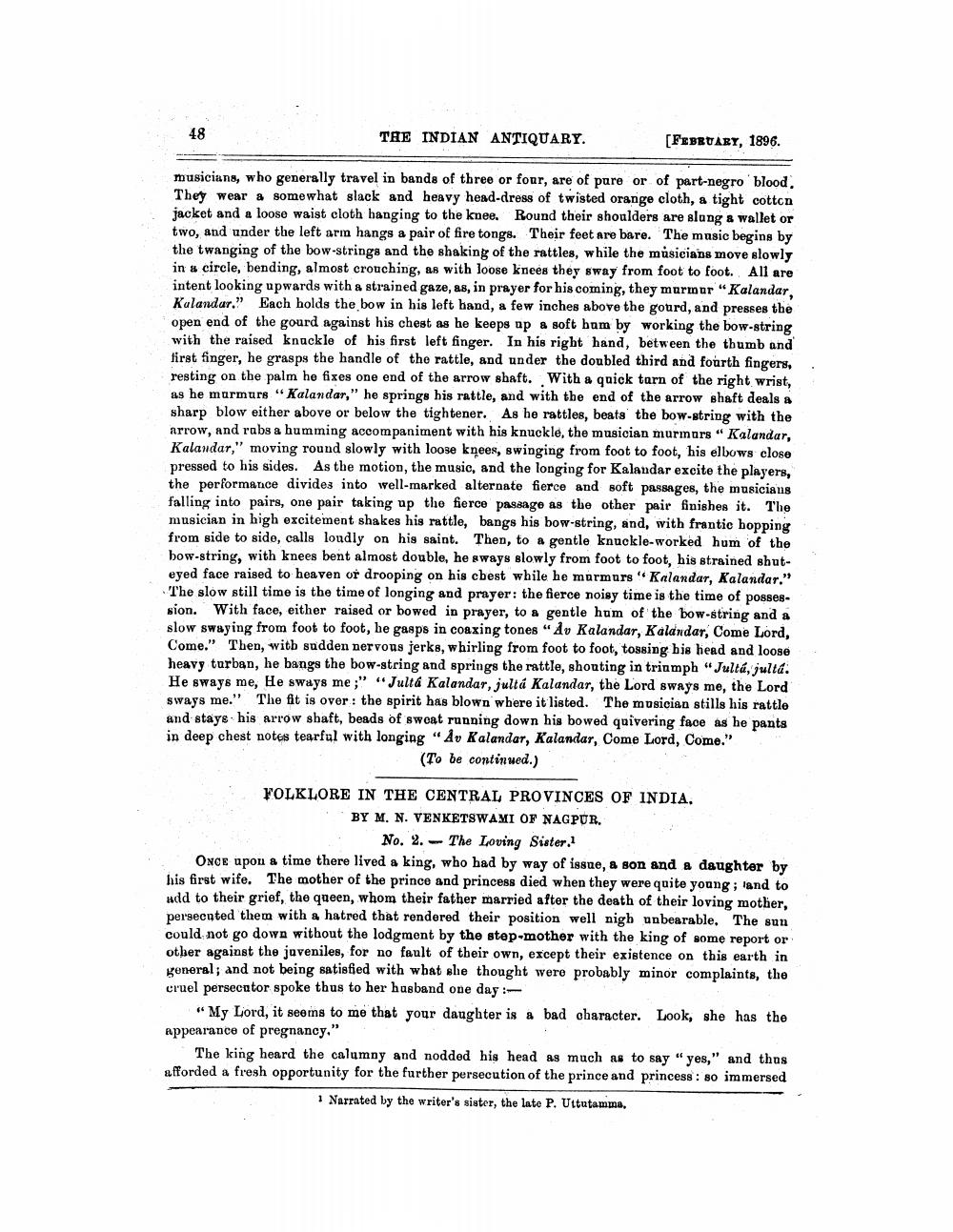________________
48
THE INDIAN ANTIQUARY.
[FEBRUARY, 1896.
musicians, who generally travel in bands of three or four, are of pure or of part-negro blood They wear a somewhat slack and heavy head-dress of twisted orange cloth, a tight cotton jacket and a loose waist cloth banging to the knee. Round their shoulders are slang & wallet or two, and under the left arm hangs a pair of fire tongs. Their feet are bare. The music begins by the twanging of the bow-strings and the shaking of the rattles, while the musicians move slowly in a circle, bending, almost crouching, as with loose knees they sway from foot to foot. All are intent looking upwards with a strained gaze, as, in prayer for his coming, they murmur "Kalandar, Kalandar." Each holds the bow in his left hand, a few inches above the gourd, and presses the open end of the gourd against his chest as he keeps up & soft bum by working the bow-string with the raised knuckle of his first left finger. In his right hand, between the thumb and first finger, he grasps the handle of the rattle, and under the doubled third and fourth fingers, resting on the palm he fixes one end of the arrow shaft. With a quick turn of the right wrist, as he murmurs "Kalandar," he springs his rattle, and with the end of the arrow shaft deals a sharp blow either above or below the tightener. As he rattles, beats the bow-string with the arrow, and rabs a humming accompaniment with his knuckle, the musician murmurs "Kalandar, Kalandar," moving round slowly with loose knees, swinging from foot to foot, his elbows close pressed to his sides. As the motion, the music, and the longing for Kalandar excite the players, the performance divides into well-marked alternate fierce and soft passages, the musicians falling into pairs, one pair taking up the fierce passage as the other pair finishes it. The musician in high excitement shakes his rattle, bangs his bow-string, and, with frantie hopping from side to side, calls loudly on his saint. Then, to a gentle knuckle-worked hum of the bow-string, with knees bent almost double, he sways slowly from foot to foot, his strained shuteyed face raised to heaven or drooping on his cbest while he marmurs "Kalandar, Kalandar." The slow still time is the time of longing and prayer: the fierce noisy time is the time of possession. With face, either raised or bowed in prayer, to a gentle hum of the bow-string and a slow swaying from foot to foot, he gasps in coaxing tones "Av Ralandar, Kalandar, Come Lord, Come." Then, with sudden nervous jerks, whirling from foot to foot, tossing his head and loose heavy turban, he bangs the bow-string and springs the rattle, shouting in triumph "Jultá, jultá. He sways me, He sways me;" "Jultá Kalandar, jultá Kalandar, the Lord sways me, the Lord sways me." The fit is over: the spirit has blown where it listed. The musician stills his rattle and stays his arrow shaft, beads of sweat running down his bowed quivering face as he pants in deep chest notes tearful with longing "Av Kalandar, Kalandar, Come Lord, Come."
(To be continued.)
FOLKLORE IN THE CENTRAL PROVINCES OF INDIA,
BY M. N. VENKETSWAMI OF NAGPUR.
No. 2. - The Loving Sister. ONCE upon a time there lived a king, who had by way of issue, a son and a daughter by his first wife. The mother of the prince and princess died when they were quite young; and to add to their grief, the queen, whom their father married after the death of their loving mother, persecated them with a hatred that rendered their position well nigb unbearable. The sun could not go down without the lodgment by the step-mother with the king of some report or other against the juveniles, for no fault of their own, except their existence on this earth in general; and not being satisfied with what slie thought were probably minor complaints, the cruel persecutor spoke thus to her husband one day :
"My Lord, it seems to me that your daughter is a bad character. Look, she has the appearance of pregnancy."
The king heard the calamny and nodded his head as much as to say "yes," and thus afforded a fresh opportunity for the further persecution of the prince and princess : so immersed
Narrated by the writer's sister, the lato P. Uttutamma,




